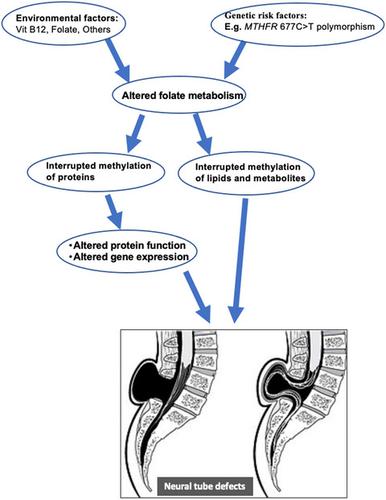当前位置:
X-MOL 学术
›
Int. J. Dev. Neurosci.
›
论文详情
Our official English website, www.x-mol.net, welcomes your
feedback! (Note: you will need to create a separate account there.)
The role of Vitamin B12 and genetic risk factors in the etiology of neural tube defects: A systematic review
International Journal of Developmental Neuroscience ( IF 1.7 ) Pub Date : 2021-04-13 , DOI: 10.1002/jdn.10113 Farah Wahbeh 1 , Mange Manyama 1
International Journal of Developmental Neuroscience ( IF 1.7 ) Pub Date : 2021-04-13 , DOI: 10.1002/jdn.10113 Farah Wahbeh 1 , Mange Manyama 1
Affiliation

|
Neural tube defects (NTDs) are birth defects that arise during embryogenesis when normal neural tube closure fails to occur. According to the World Health Organization, NTDs are detected annually in approximately 300,000 neonates worldwide. The exact etiology of NTDs remains complex and poorly understood. It is generally agreed that most NTD cases are of multifactorial origin, having a combination of multiple genes and a number of environmental risk factors. The role of folic acid, vitamin B12 deficiency, genetics and other risk factors, in the etiology of NTDs, has also been extensively studied. This knowledge synthesis brings together different types of evidence to update the role of vitamin B12 deficiency, genetics and other risk factors, in the etiology of NTDs. Following a PubMed search and screening for relevant articles, we included 40 studies in our review (30 case–control studies, 3 cross-sectional studies, 5 cohort studies, and 2 case reports). The available data showed that vitamin B12 levels were decreased in mothers and infants in NTD groups compared with control groups. Holo-transcobalamin, the active form of vitamin B12, was also found in lower levels in mothers with NTD-affected infants. Several studies reported elevated homocysteine levels in mothers and infants in NTD groups. Additionally, numerous studies reported links between genetic variants and increased NTD risk. These genes include GIF, LRP2, CUBN, TCb1R, MTHFR, and others. Several maternal factors have also been linked with significant NTD risk such as BMI, maternal diet, air pollutants, low maternal age, and many others. The majority of studies on NTDs have focused on the role of folic acid, hence there is a need for well-designed studies on the role of other risk factors like vitamin B12 deficiency in the etiology of NTDs.
中文翻译:

维生素 B12 和遗传危险因素在神经管缺陷病因学中的作用:系统评价
神经管缺陷 (NTD) 是胚胎发生过程中正常神经管闭合失败时出现的出生缺陷。根据世界卫生组织的数据,全世界每年约有 300,000 名新生儿被检测到 NTD。NTD 的确切病因仍然复杂且知之甚少。人们普遍认为,大多数 NTD 病例是多因素起源的,具有多个基因和许多环境风险因素的组合。叶酸、维生素 B12 缺乏、遗传和其他风险因素在 NTD 病因学中的作用也得到了广泛研究。这种知识综合汇集了不同类型的证据,以更新维生素 B12 缺乏、遗传和其他风险因素在 NTD 病因学中的作用。在 PubMed 搜索和筛选相关文章后,我们在评价中纳入了 40 项研究(30 项病例对照研究、3 项横断面研究、5 项队列研究和 2 项病例报告)。现有数据显示,与对照组相比,NTD 组母亲和婴儿的维生素 B12 水平降低。在患有 NTD 影响的婴儿的母亲中,也发现了维生素 B12 的活性形式全环钴胺素的含量较低。几项研究报告了 NTD 组母亲和婴儿的同型半胱氨酸水平升高。此外,许多研究报告了遗传变异与 NTD 风险增加之间的联系。这些基因包括 GIF、LRP2、CUBN、TCb1R、MTHFR 等。一些孕产妇因素也与严重的 NTD 风险有关,例如 BMI、孕产妇饮食、空气污染物、孕产妇年龄低等。大多数关于 NTD 的研究都集中在叶酸的作用上,
更新日期:2021-04-13
中文翻译:

维生素 B12 和遗传危险因素在神经管缺陷病因学中的作用:系统评价
神经管缺陷 (NTD) 是胚胎发生过程中正常神经管闭合失败时出现的出生缺陷。根据世界卫生组织的数据,全世界每年约有 300,000 名新生儿被检测到 NTD。NTD 的确切病因仍然复杂且知之甚少。人们普遍认为,大多数 NTD 病例是多因素起源的,具有多个基因和许多环境风险因素的组合。叶酸、维生素 B12 缺乏、遗传和其他风险因素在 NTD 病因学中的作用也得到了广泛研究。这种知识综合汇集了不同类型的证据,以更新维生素 B12 缺乏、遗传和其他风险因素在 NTD 病因学中的作用。在 PubMed 搜索和筛选相关文章后,我们在评价中纳入了 40 项研究(30 项病例对照研究、3 项横断面研究、5 项队列研究和 2 项病例报告)。现有数据显示,与对照组相比,NTD 组母亲和婴儿的维生素 B12 水平降低。在患有 NTD 影响的婴儿的母亲中,也发现了维生素 B12 的活性形式全环钴胺素的含量较低。几项研究报告了 NTD 组母亲和婴儿的同型半胱氨酸水平升高。此外,许多研究报告了遗传变异与 NTD 风险增加之间的联系。这些基因包括 GIF、LRP2、CUBN、TCb1R、MTHFR 等。一些孕产妇因素也与严重的 NTD 风险有关,例如 BMI、孕产妇饮食、空气污染物、孕产妇年龄低等。大多数关于 NTD 的研究都集中在叶酸的作用上,











































 京公网安备 11010802027423号
京公网安备 11010802027423号